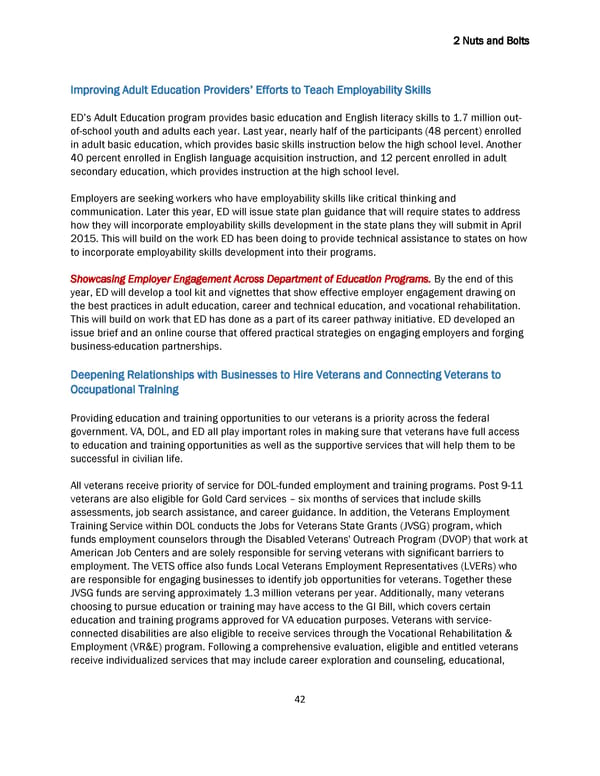2 Nuts and Bolts Improving Adult Education Providers’ Efforts to Teach Employability Skills ED’s Adult Education program provides basic education and English literacy skills to 1.7 million out- of-school youth and adults each year. Last year, nearly half of the participants (48 percent) enrolled in adult basic education, which provides basic skills instruction below the high school level. Another 40 percent enrolled in English language acquisition instruction, and 12 percent enrolled in adult secondary education, which provides instruction at the high school level. Employers are seeking workers who have employability skills like critical thinking and communication. Later this year, ED will issue state plan guidance that will require states to address how they will incorporate employability skills development in the state plans they will submit in April 2015. This will build on the work ED has been doing to provide technical assistance to states on how to incorporate employability skills development into their programs. Showcasing Employer Engagement Across Department of Education Programs. By the end of this year, ED will develop a tool kit and vignettes that show effective employer engagement drawing on the best practices in adult education, career and technical education, and vocational rehabilitation. This will build on work that ED has done as a part of its career pathway initiative. ED developed an issue brief and an online course that offered practical strategies on engaging employers and forging business-education partnerships. Deepening Relationships with Businesses to Hire Veterans and Connecting Veterans to Occupational Training Providing education and training opportunities to our veterans is a priority across the federal government. VA, DOL, and ED all play important roles in making sure that veterans have full access to education and training opportunities as well as the supportive services that will help them to be successful in civilian life. All veterans receive priority of service for DOL-funded employment and training programs. Post 9-11 veterans are also eligible for Gold Card services – six months of services that include skills assessments, job search assistance, and career guidance. In addition, the Veterans Employment Training Service within DOL conducts the Jobs for Veterans State Grants (JVSG) program, which funds employment counselors through the Disabled Veterans' Outreach Program (DVOP) that work at American Job Centers and are solely responsible for serving veterans with significant barriers to employment. The VETS office also funds Local Veterans Employment Representatives (LVERs) who are responsible for engaging businesses to identify job opportunities for veterans. Together these JVSG funds are serving approximately 1.3 million veterans per year. Additionally, many veterans choosing to pursue education or training may have access to the GI Bill, which covers certain education and training programs approved for VA education purposes. Veterans with service- connected disabilities are also eligible to receive services through the Vocational Rehabilitation & Employment (VR&E) program. Following a comprehensive evaluation, eligible and entitled veterans receive individualized services that may include career exploration and counseling, educational, 42
 Biden Ready to Work White Paper 7/22/14 Page 41 Page 43
Biden Ready to Work White Paper 7/22/14 Page 41 Page 43